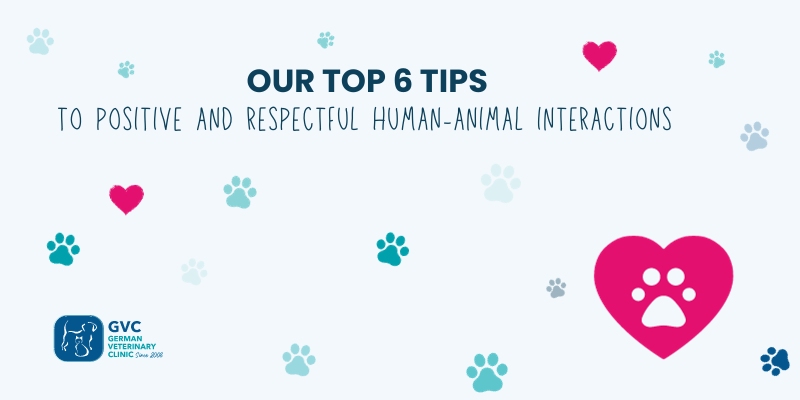Opening Hours: Mon-Fri: 8AM-8PM. Sat-Sun: 9AM-5PM. Public Holidays: 9AM-5PM.
info@germanvet.ae | 025562024

Here at GVC we place huge value on applying a holistic approach to pet healthcare which means that we will always consider an animal’s healthcare and welfare from a physical, mental, and emotional approach.
Now, there is a massive amount of information to learn about all three areas but while most vets are experts in the physical, it’s the mental and emotional aspects that can be hardest to qualify and quantify. Luckily GVC’s owner and Head Vet, Dr Katrin, is currently specializing in these areas and has been demonstrating some fantastic results with cats and dogs by recognizing what owners can do to support their animal’s mental and emotional health and happiness.
However, what we’re actually looking to communicate here is the importance of our behaviour when interacting with our animal friends, because obviously it’s a two-way street and what we do and convey can directly impact how our furry pals act, react and live. As the title suggests, it really is something best learnt from a young age as there is certainly evidence to suggest that many pet/human accidents occur as much due to misunderstanding as any other factor.
For example, as a dog owner (without children at home) I am always wary of approaching groups of young children when walking the pooches, not because I have any concerns about the dogs’ behaviour, as they are entirely consistent and friendly. No, because the prospect of young children who do not know how to act around animals creates a stress spike in me. Rushing, yelling, grabbing, and poking are all such inappropriate behaviours but sadly are often both the norm and tolerated by the youngsters’ carers and nannies.
Whilst animals are a cause for happy excitement and pleasure in children of all ages (over 40’s included), the pleasure for both human and animal is multiplied enormously by remembering and following a few basic rules, simple pointers to help ensure friendly fun:
As adults, we should always set the right example. Children mimic our actions so if they see adults teasing, shouting, or acting in a negative way towards animals, they are likely to follow… and this is where we really believe a difference can be made that will have a positive impact across generations. After all, the bond between humans and animals has been demonstrated over a couple of millennia and more, so this really should be something we cherish and want to enhance wherever possible. The happiness they can bring should, as a minimum, be reciprocal.
This is why GVC’s vets visit nursery schools – because it’s definitely a great idea to start young and help develop some positive associations for the toddlers to remember and grow with. There’s a very good chance that animals will play a part in their lives so learning a few very simple steps now may help to make those relationships as loving and joyful as possible.
And for you adults, if you have any concerns or feel that maybe your pet’s behaviour suggests they aren’t 100% happy, then make an appointment to see your vet as they’ll be able to advise on the physical and then be able to refer any potential emotional or mental aspects for further discussion. A happy pet is often a healthy pet but sometimes a healthy pet may not be a happy one and this is something that we are always very keen to help with.
Call 02 556 2024 or email info@germanvet.ae to learn more.
GVC was established by Dr Katrin in 2008 and was the very first veterinary clinic in Khalifa City A. We have known many of our clients and patients for close to 10 years and have always held the reputation of being a top quality, dependable and caring service provider.
LINKS

© 2024 German Veterinary Clinic. All rights reserved.